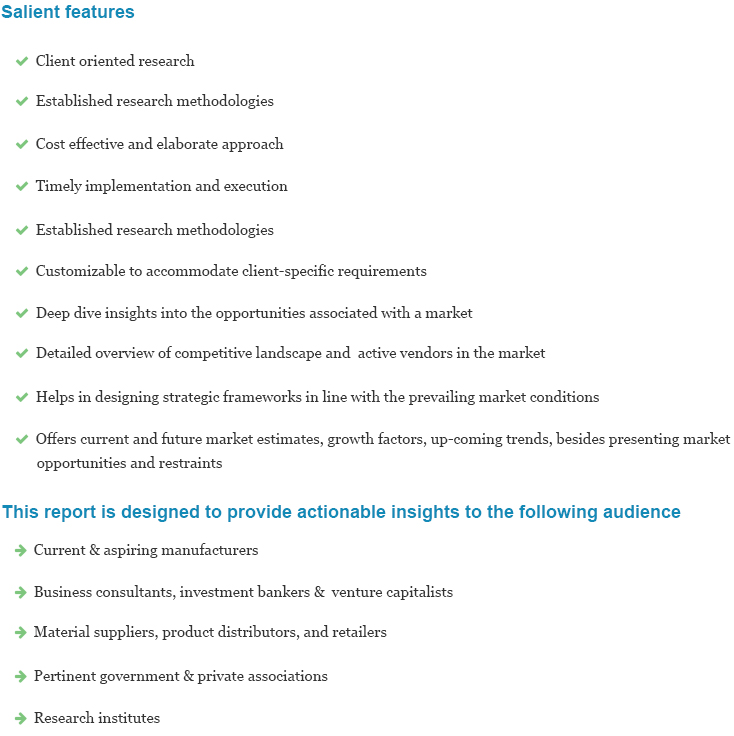
Online Education Market Size, Share, Analysis, Trends, Research, Competitive Strategies and Forecasts, 2017 To 2025
- Published: December, 2018
- Format: Electronic (PDF)
- Number of pages: 70
- Industry: Consumer Goods
The global online education market is slated to progress at a remarkable CAGR during the forecast period, from 2017 to 2025. Online education programs offer flexibility in learning, easy accessibility, low cost, and increased effectiveness. The market is likely to thrive on limitations of traditional education system. E-learning, compared to conventional learning, is more convenient, saves time, money, and energy, does not require much in terms of infrastructure, and can be gained from the comfort of one’s home or office. Rising adoption of e-learning platforms by educational institutes and corporate organizations is poised to work in favor of the market.
Governments in several countries, in their pursuit to digitize the education system, are significantly investing in the market. Several countries are transitioning from a conventional teacher-centred approach to learner-centric methods. As a result, the market is projected to attain significant value toward the end of forecast period.
Proliferation of smartphones and other portable devices, coupled with improving internet infrastructure, is anticipated to stoke market growth. Platforms that incorporate gaming to facilitate learning have been gaining popularity in recent years. Advancements in IT security and growing adoption of cloud-based technologies are enabling users to enjoy a smooth learning experience via safe online education infrastructure, thereby providing a fillip to the market. In addition, rapid improvements in the field of artificial intelligence are estimated to bolster market growth.
There is an increasing shift toward SaaS-based solutions and learning software to improve overall learning experience. Big data analytics is playing a vital role in the field of online education as massive data can be effectively managed and utilized to enhance overall curriculum or training. Online learning programs are not only limited to academic institutes, but also find application in corporate set-ups as they provide scope for customization and collaboration.
On the other hand, continual advancements in technologies pertaining to online education can lead to technology obsolescence, which can act as a challenge for market players. Moreover, lack of awareness in developing or less developed countries can inhibit market growth.
The global online education market comprises faculty support, content providers, and service providers. There is high demand for content across the world due to increase in inclination toward self-paced learning among employees and students. Some of the technologies related to e-learning are virtual classroom, learning content management system, knowledge management system, application simulation tool, learning management system, podcasts, and mobile and rapid e-learning.
Geographically, developed regions such as North America and Europe are expected to account for a larger cumulative share in the market over the forecast period. There is a higher adoption of advanced technologies in these regions compared to developing markets. Moreover, universities are collaborating with each other to introduce e-learning programs that are flexible and offer enhanced learning experience. State-of-the-art IT infrastructure and early adoption of cloud and artificial technologies have also contributed to the growth of these regional markets.
Asia Pacific (APAC), on the other hand, is likely to witness substantial growth during the forecast period, which can be attributed to increasing government spending on the education sector. Dearth of trained teachers in schools and colleges is resulting in increase in inclination for self-reliant learning programs, thereby supplementing market growth in APAC.
Players in the global market are focusing on innovation and differentiation to stay ahead in the competition. They are collaborating with governments and educational institutes to consolidate their position in the market. Mergers and acquisitions have been a go-to growth strategy for a number of players. For instance, in October 2018, Acadview Software, a skill developing platform, was acquired by UpGrad, an online higher education company. The acquisition was aimed at helping the latter to provide learning solutions to deliver education regarding in-demand technologies, upgrade skills of college students, and bridge their employability gap.
Some of the prominent companies operating in the market are Apollo Education Group Inc.; Adobe systems Inc.; Citrix; Cisco Systems; McGrawHill; HealthStream Inc.; Cisco; Aptara; SAP; Oracle; Saba Software; Microsoft; Blackboard Inc.; Pearson; Skill Soft; Desire2Learn; N2N Services; Articulate; Tata Interactive Systems; and Haiku Learning.

Choose License Type
- World's largest premium report database
- Transparent pre & post sale customer engagement model
- Unparalleled flexibility in terms of rendering services
- Safe & secure web experience
- 24*5 Research support service
